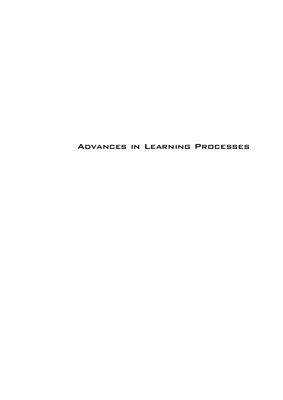Издательство InTech, 2009, -292 pp.
This volume includes a broad range of contributions in the general area of the leaing sciences and associated advances in technology-supported education. The 18 chapters are extended versions of work originally presented as conference papers or as short joual articles. In most cases, authors were invited directly to submit a paper for inclusion in this volume; however each submission has subsequently been refined through a comprehensive review and editing process.
Readers will find several papers that address high-level issues in the use of technology in education, for example architectures and design frameworks for building online education materials or tools. Several other chapters report novel approaches to intelligent tutors or adaptive systems in educational settings. A number of chapters consider the many roles for social computing in education, from simple computer-mediated communication support to more extensive community-building frameworks and tools. Finally, several chapters report state-of-the-art results in tools that can be used to assist educators in critical tasks like content presentation and grading.
A Model of Project-Based Leaing to Develop Information Systems Engineers and Managers through Collaborative Management Approach
Educational Modelling Languages and Service-Oriented Leaing Process Engines
Multi-agent Architecture for Retrieving and Tailoring LOs in SCORM Compliant Distance Leaing Environments
E-Testing Construction Support System with some Prediction Tools
Adaptative Leaing Environment for Geometry
Personalized Leaing Path Delivery
Advances in Artificial Intelligence to Model Student-Centred VLEs
M-PLAT: Multi-Programming Language Adaptive tutor
Adaptive and Collaborative Leaing Using netUniversity, an interoperable LMS/LCMS
wConnect: A Developmental Community for Women in Computer and Information Science
EduWiki: A Knowledge Construction System for Collaborative Leaing
Realization of Swift and Expressive Chat in CSCL: Reach Project
Network of Schools as a Framework to Support E-Leaing within Educational Communities
Visual analytics to support e-leaing
Informing Instructional Design Using Microgenetic Analysis of ICT-based Collaboration: A Misconceptions Perspective
An analysis using eye-mark recorder of the effectiveness of presentation methods for e-leaing
Pedagogical use of automatic graders
An Item Response Theory for Peer Assessment
This volume includes a broad range of contributions in the general area of the leaing sciences and associated advances in technology-supported education. The 18 chapters are extended versions of work originally presented as conference papers or as short joual articles. In most cases, authors were invited directly to submit a paper for inclusion in this volume; however each submission has subsequently been refined through a comprehensive review and editing process.
Readers will find several papers that address high-level issues in the use of technology in education, for example architectures and design frameworks for building online education materials or tools. Several other chapters report novel approaches to intelligent tutors or adaptive systems in educational settings. A number of chapters consider the many roles for social computing in education, from simple computer-mediated communication support to more extensive community-building frameworks and tools. Finally, several chapters report state-of-the-art results in tools that can be used to assist educators in critical tasks like content presentation and grading.
A Model of Project-Based Leaing to Develop Information Systems Engineers and Managers through Collaborative Management Approach
Educational Modelling Languages and Service-Oriented Leaing Process Engines
Multi-agent Architecture for Retrieving and Tailoring LOs in SCORM Compliant Distance Leaing Environments
E-Testing Construction Support System with some Prediction Tools
Adaptative Leaing Environment for Geometry
Personalized Leaing Path Delivery
Advances in Artificial Intelligence to Model Student-Centred VLEs
M-PLAT: Multi-Programming Language Adaptive tutor
Adaptive and Collaborative Leaing Using netUniversity, an interoperable LMS/LCMS
wConnect: A Developmental Community for Women in Computer and Information Science
EduWiki: A Knowledge Construction System for Collaborative Leaing
Realization of Swift and Expressive Chat in CSCL: Reach Project
Network of Schools as a Framework to Support E-Leaing within Educational Communities
Visual analytics to support e-leaing
Informing Instructional Design Using Microgenetic Analysis of ICT-based Collaboration: A Misconceptions Perspective
An analysis using eye-mark recorder of the effectiveness of presentation methods for e-leaing
Pedagogical use of automatic graders
An Item Response Theory for Peer Assessment

